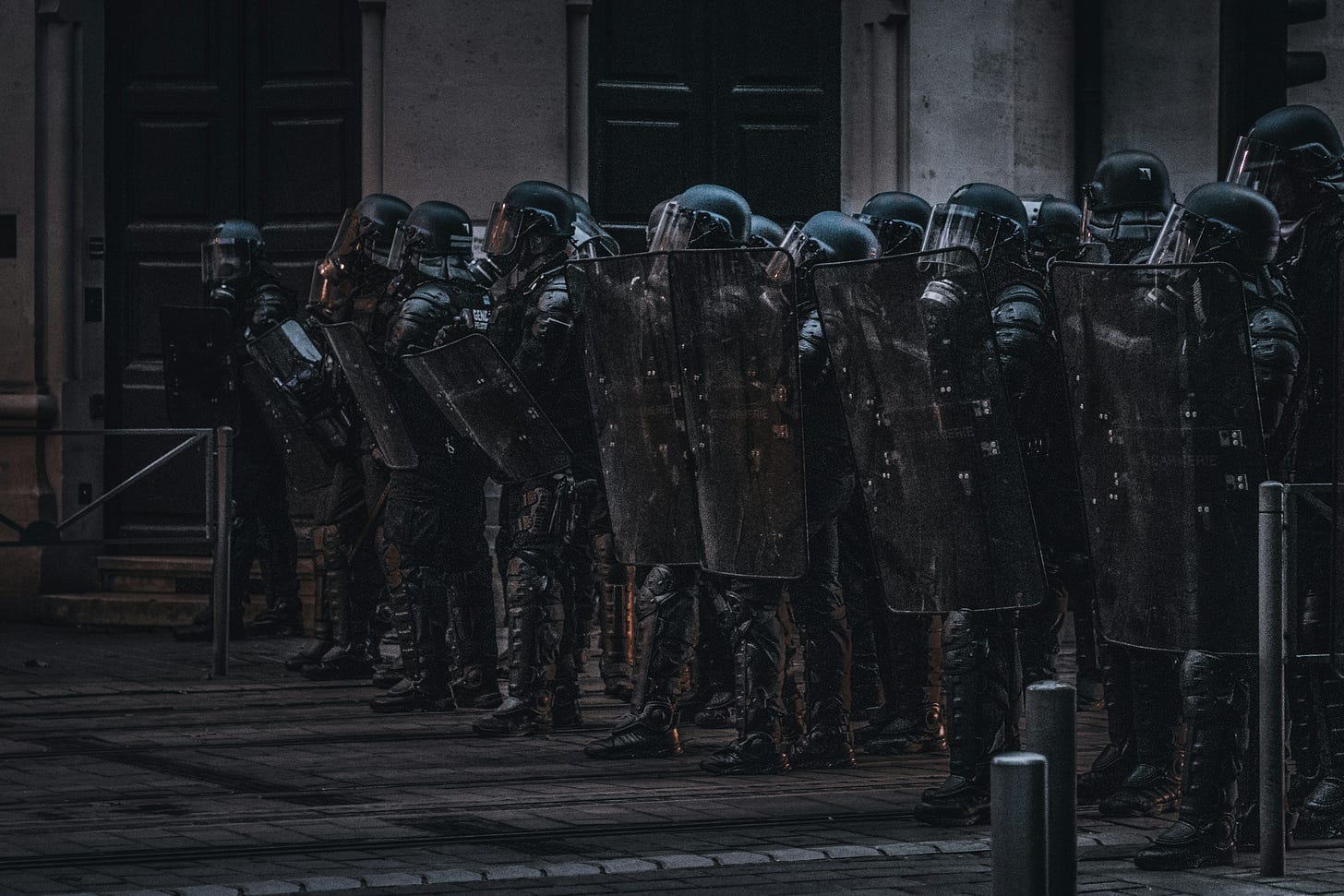Football is the Police State's Petri Dish
As is the custom, the Police Union publish their thoughts on the Bundesliga launch
Some housekeeping first: As of this week, Unmodern Football is also available in German! You can read this article in German here.
If you speak German, please head over and give it a sub. Or, if you know German-speaking football fans, I’d really appreciate a recommendation.
There’s nothing certain in this world – except death, taxes, and that the German police union will, like clockwork, call for more repression against football fans the week the Bundesliga kicks off.
And lo and behold: Saturday marks the start of the season, and who pops up on Instagram? The German Police Union (Gewerkschaft der Polizei, GdP):
“Violence doesn’t stop at stadium gates. The police face immense challenges. We expect deployments to rise significantly this season.”
Included is a wish list by the union bos: more private security, facial recognition, biometric scanners, zero tolerance for antisemitism, hate, and pyro, a ban commission, more club board involvement.
It almost sounds like they care. Like this is about fan safety. About tackling racism, maybe? After the DFB-Pokal debacle last weekend?
Don’t fall for it.
None of this exists in a vacuum. These statements – and the media outlets that amplify them – are part of a broader agenda. They’re populist, misleading, and anything but altruistic.
Back in 2009, the Wiener Zeitung ran with a headline: “Germany among top police states,” citing its heavy use of mass surveillance. And no, things haven’t improved since.
In 2021, even the neoliberal Friedrich Naumann Foundation – hardly a leftist think tank – published a report outlining at least 15 forms of mass surveillance, mostly indiscriminate, plus around 50 ways authorities can gather data. That’s not theory. That’s today’s Germany.
And now, with predictive policing tools like Palantir entering the chat, we’re not talking slippery slope anymore. We’re halfway down it, waving to our civil liberties as we go.
Statista estimates police killings will surpass last year’s record. And researchers at Ruhr University Bochum estimate at least 12,000 cases of unlawful police violence per year. That’s five times more than ever get reported.
So what’s that got to do with football?
Everything.
Football is the state’s playground. Its petri dish. A controlled lab for testing how far they can push repression without causing public outcry.
Because football fans? We’re the perfect enemy. We don’t have a lobby. We’re already suspicious by default. Rowdy. Loud. Uncomfortable. Drunk. At best, an eyesore. At worst, a security threat.
Football’s still seen as lower-class entertainment. The bourgeois gaze upon it like it’s beneath them – and here’s the real kicker: so does a broad alliance of the radical left, the centre, and the far right. When the cops crack down on fans, the consensus is: Well, they probably had it coming.
Until it's someone else’s turn.
To be clear: I’m not saying football doesn’t have a problem with violence. But police involvement in football far exceeds what’s happening on the ground.
Yes, there’s violence around football.
But not primarily at matches. Not in the stands.
Domestic violence, for instance, statistically spikes on matchdays – that’s real and terrible. And it’s getting worse. And it’s not football causing it. It’s society. Football just reflects it.
So how dangerous are games really?
Take Hamburg. Two top-tier clubs. Huge fanbases. Massive rivalry.
According to Braun-Weiße Hilfe, a local fan legal aid group, the danger level at FC St. Pauli’s home games last season was mostly assessed by the police as low. Ten matches rated “low risk”, five “medium”, only two rated “high”: Kiel and Union Berlin.
In total, Hamburg police initiated 102 investigations across 17 home games. That’s six per matchday. Out of tens of thousands of attendees, that’s 0.02%. And an investigation isn’t a conviction. It’s not even guilt. It’s a file number.
And in the rest of the country? Let’s ask the police themselves: With 28.65 million spectators across all stadiums, there were 1,338 injuries (306 of them police officers – and it’s basically a meme by now that cops who manage to injure themselves with their own pepper spray still count toward the stats).
That means: 0.004 percent of football match attendees run the risk of getting injured.
For comparison: 3.5% of Germans injure themselves in accidents at home.
How many criminal proceedings were initiated? 7,351. Measured against the number of spectators, that’s:
0.02%.1
So what’s really going on?
They’re stress-testing us. Seeing how far they can go.
I’ve been going to games since I was a teenager. I can count truly serious incidents on one hand. And let me say this loud and clear: I’ve never felt safer because of the police. Quite the opposite. Some of the scariest moments at matches started because police units stormed the pitch without reason.
I saw it again recently at the DFB-Pokal final. Tens of thousands of fans – Bielefeld and Stuttgart – celebrating peacefully across Berlin. No sector separation inside the stadium. Mixed fans, good vibes, friendly banter.
Midway through the second half, for reasons still unexplained, multiple police squads stormed the interior. Riot gear, helmets, the whole theatre. Security staff had things under control. The cops created the tension they were supposedly deployed to prevent.
One might suspect someone had to justify their overtime.
So yeah – I’m sceptical. Whenever I hear calls for more surveillance, more control, more “zero tolerance” – especially from the police union.
And you should be too.
Because today, it’s “just the football fans.”
Tomorrow, it’s your mates.
And the day after?
It’s you.
Thank you to DerCheef on BlueSky for pointing these numbers out




This sounds familiar, although it is already expanding from football. In England the government are forever coming up with new ways to keep us safe and only a bad person would complain.